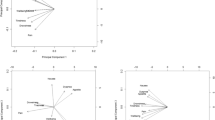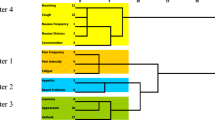Abstract
Purpose
The purpose of this paper is to determine whether the use of three different statistical methods influences the composition of symptom clusters derived from patients with brain metastases.
Materials and methods
The dataset previously compiled from 129 brain metastases patients who completed the Spitzer Quality of Life Index (SQLI) and an additional study-designed 17-item symptom questionnaire was employed in this study. Symptom clusters extracted using principal component analysis in our previous study were compared to clusters determined using hierarchical cluster analysis and exploratory factor analysis. Clusters were identified using the three statistical methods at baseline, and at 1, 2, and 3 months following whole brain radiotherapy.
Results
The number and composition of symptom clusters at each time point varied based on the statistical method employed, despite the use of an identical dataset. However, some domains consistently clustered together, such as activity and daily living from the SQLI items. Of the 17 additional symptoms, memory loss, confusion, and trouble concentrating were always present in the same cluster. Nausea and vomiting also occurred in conjunction regardless of the analytical method employed.
Conclusion
Symptom clusters vary with respect to occurrence, quantity, and composition based on the statistical method utilized to extract them. Further studies should be conducted to determine an ideal statistical method in order to select the optimal method to employ. The use of a single analytical method is essential for consistency and comparison purposes in future symptom cluster research.

Similar content being viewed by others
References
Chow E, Davis L, Holden L, Tsao M, Danjoux C (2005) Prospective assessment of patient-rated symptoms following whole brain radiotherapy for brain metastases. J Pain Symptom Manag 30:18–23
Langer CJ, Mehta MP (2005) Current management of brain metastases, with a focus on systemic options. J Clin Oncol 25:6207–6219
Patchell RA (2003) The management of brain metastases. Canc Treat Rev 29:533–540
Pease NJ, Edwards A, Moss LJ (2005) Effectiveness of whole brain radiotherapy in the treatment of brain metastases: a systematic review. Palliat Med 19:288–299
Tsao MN, Lloyd N, Wong R, Chow E, Rakovitch E, Lapirriere N (2005) Radiotherapeutic management of brain metastases: a systematic review and meta-analysis. Canc Treat Rev 31:256–273
Dodd MJ, Miaskowski C, Paul SM (2001) Symptom clusters and their effect on the functional status of patients with cancer. Oncol Nurs Forum 28(3):465–470
Kwekkeboom KL, Cherwin CH, Lee JW, Wanta B (2010) Mind-body treatments for the pain-fatigue sleep disturbance symptom cluster in persons with cancer. J Pain Symptom Manag 39(1):126–138
Kim HJ, McGuire DB, Tulman L, Barsevick AM (2005) Symptom clusters: concept analysis and clinical implications for cancer nursing. Canc Nurs 28(4):270–282, quiz 283-4
Xiao C (2010) The state of science in the study of cancer symptom clusters. Eur J Oncol Nurs 14(5):417–434
Hird A, Wong J, Zhang L, Tsao M, Barnes E, Danjoux C, Chow E (2010) Exploration of symptom clusters within cancer patients with brain metastases using the Spitzer Quality of Life Index. Support Care Canc 18:335–342
Skerman HM, Yates PM, Battistutta D (2009) Multivariate methods to identify cancer-related symptom clusters. Res Nurs Health 32(3):345–360
Kim HJ, Abraham IL (2008) Statistical approaches to modeling symptom clusters in cancer patients. Canc Nurs 31(5):E1–E10
Barsevick AM, Whitmer K, Nail LM, Beck SL, Dudley WN (2006) Symptom cluster research: conceptual, design, measurement, and analysis issues. J Pain Symptom Manag 31(1):85–95
Gleason JF Jr, Case D, Rapp SR, Ip E, Naughton M, Butler JM Jr et al (2007) Symptom clusters in patients with newly-diagnosed brain tumors. J Support Oncol 436(5(9)):427–433
Maliski SL, Kwan L, Elashoff D, Litwin MS (2008) Symptom clusters related to treatment for prostate cancer. Oncol Nurs Forum 35(5):786–793
Henoch I, Ploner A, Tishelman C (2009) Increasing stringency in symptom cluster research: a methodological exploration of symptom clusters in patients with inoperable lung cancer. Oncol Nurs Forum 36(6):E282–E292
Donovan KA, Jacobsen PB, Andrykowski MA, Winters EM, Balducci L, Malik U et al (2004) Course of fatigue in women receiving chemotherapy and/or radiotherapy for early stage breast cancer. J Pain Symptom Manag 28(4):373–380
Glaus A, Boehme C, Thurlimann B, Ruhstaller T, Hsu Schmitz SF, Morant R et al (2006) Fatigue and menopausal symptoms in women with breast cancer undergoing hormonal cancer treatment. Ann Oncol 17(5):801–806
Khalid U, Spiro A, Baldwin C, Sharma B, McGough C, Norman AR et al (2007) Symptoms and weight loss in patients with gastrointestinal and lung cancer at presentation. Support Care Canc 15(1):39–46
Kirkova J, Walsh D (2007) Cancer symptom clusters—a dynamic construct. Support Care Canc 15(9):1011–1013
Acknowledgment
We thank the support of the Ofelia Cancer Research Fund.
Conflict of interest
The authors have no conflicts of interest to declare.
Author information
Authors and Affiliations
Corresponding author
Rights and permissions
About this article
Cite this article
Khan, L., Cramarossa, G., Lemke, M. et al. Symptom clusters using the Spitzer quality of life index in patients with brain metastases—a reanalysis comparing different statistical methods. Support Care Cancer 21, 467–473 (2013). https://doi.org/10.1007/s00520-012-1540-6
Received:
Accepted:
Published:
Issue Date:
DOI: https://doi.org/10.1007/s00520-012-1540-6




